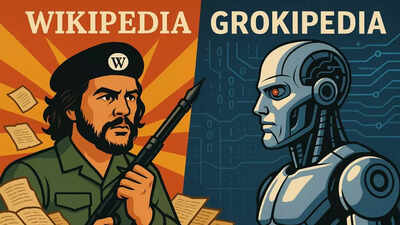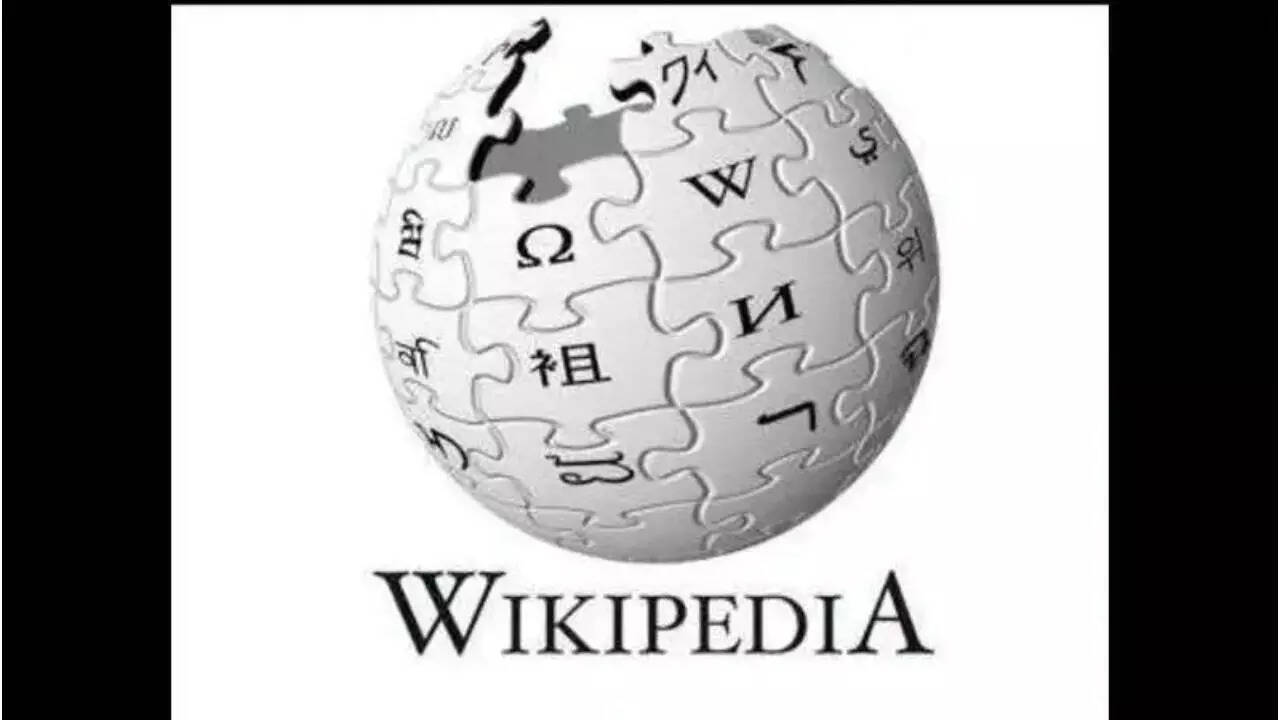ARTICLE AD BOX

Elon Musk’s Grokipedia — a new AI-generated online encyclopaedia — landed on the internet this week with all the subtlety of a rocket test launch. Styled unmistakably like Wikipedia, complete with a sparse search bar and minimalist font, the site quietly announced itself as “Grokipedia v0.1,” boasting roughly 885,000 entries — a fraction of Wikipedia’s eight million but, in true Musk fashion, launched anyway with the promise that v1.0 will be “10x better.
”Behind the hype lies an ambition larger than just rewriting the internet’s encyclopaedia: Musk wants to challenge who gets to define truth. Grokipedia, built by Musk’s xAI team and powered by its Grok large language model, is positioned as a “less biased” alternative to the “venerable” Wikipedia. Of course, in Musk-world, “less biased” translates loosely to “more aligned with Elon’s worldview.” Not that Wikipedia isn’t biased — and in particular topics, is left of Fidel Castro.Critics say it’s a self-congratulatory mirror hall riddled with factual errors, ideological slant, and at times, lifted Wikipedia text. Admirers claim it’s the first salvo in a larger culture war to reclaim digital knowledge. Somewhere in between lies the real story: a billionaire, a bot, and a battle for epistemic supremacy — a game the Left has perfected since dawn immemorial.Read: Why our AI choices are MechaHitler or Black George Washington
Musk’s Mission: Build Back Bitter
In a tweet from 2017, Musk professed his affection: “I love Wikipedia.
Just gets better over time.” Fast-forward to 2023, and the romance had curdled. Musk was calling Wikipedia a “non-trivial left-wing propaganda machine,” offering $1 billion if it renamed itself “Dickipedia,” and endorsing calls to “defund Wikipedia until balance is restored.”This wasn’t just idle trolling. Musk, like many in his ideological cohort, came to see Wikipedia not as a neutral arbiter of facts but as a digital citadel of progressivism — where narratives around gender, race, climate, and politics leaned too far left for comfort.
Thus Grokipedia was born — not as a collaborative encyclopaedia like Wikipedia, but as an AI oracle with a self-proclaimed mission to seek “the truth, the whole truth, and nothing but the truth.
” Musk’s truth, naturally.And if that sounds like an ambitious elevator pitch for a crowdsourced knowledge clone, just remember: this is the man who named his child X Æ A-12 and launched a flamethrower for fun.
The Bias Before the Bot

To understand Grokipedia’s raison d’être, one must understand the slow drift of Wikipedia itself.
Over the past decade, multiple studies have shown that Wikipedia’s political coverage subtly but consistently tilts left.A Harvard Business School paper by Shane Greenstein and Feng Zhu found that Wikipedia’s U.S. politics articles were “more slanted toward Democratic views” than Encyclopædia Britannica. The Manhattan Institute went further, noting a “mild to moderate tendency” to describe right-leaning figures with more negative sentiment than their left-leaning counterparts.
Even Wikipedia co-founder Larry Sanger has accused the project of becoming “an establishment-left monoculture” that marginalises dissenting editors.Wikipedia admits as much — in bureaucratic tones. Its own reliability page lists “systemic bias, selection bias, inclusion bias, and participation bias” as recurring issues. Translation: whoever edits most, wins. And most of those editors are Western, male, English-speaking, and liberal-leaning.So while Musk’s “Dickipedia” jibe may have been adolescent, it wasn’t entirely unfounded. Wikipedia has ideological gravity. Once an article begins slanted, it tends to stay that way. Its neutrality is a moving average of its editors’ worldviews — a statistical democracy masquerading as objectivity.
Framing the Frame: Gender, 6 January, and the AI Culture War
Of course, Wikipedia has mastered the Chomskian art of changing what a word means. Take its laboured take on gender: “Gender is the range of social, psychological, cultural, and behavioural aspects of being a man, woman, or third gender.”
That’s the sort of prose that passes off as science in woke-land — and which many biologists quietly roll their eyes at.On the other hand, Grokipedia defines gender as “the binary classification of humans as male or female based on biological sex,” but conveniently ignores the complexity beyond the binary — like a coin landing on its edge.On topics like the 6 January Capitol riot, Grokipedia doesn’t deny the facts — but it does reframe them, suggesting that Democrats and mainstream media “exaggerated” the attack’s severity and Donald Trump’s role.
Elsewhere, it wanders straight into culture-war territory. Search “gay marriage,” and early users found detours into pornography and pseudoscience. The “transgender” article used the term “transgenderism” (long abandoned by medical communities) and referred to trans women as “biological males.
”These aren’t lexical accidents — they’re shibboleths of a tribe. In short, Grokipedia isn’t an encyclopaedia.
It’s an AI-powered opinion machine with the tone of a polite Breitbart intern.
The Cult of Elon: A Biography Written by a Fan Club

Nowhere is Grokipedia’s slant more pronounced than in its entry on Elon Musk. Clocking in at nearly 11,000 words, the piece reads like a press release ghostwritten by one of Musk’s own burner accounts. His AI pushes are described as “truth-oriented development.” His companies are praised for “rapid iteration” and “safeguarding human consciousness.”Where Wikipedia’s Musk page is a battlefield of edits and footnotes, Grokipedia’s version is polished, glowing, and error-prone. It falsely claims that Vivek Ramaswamy assumed a larger U.S. advisory role after Musk’s exit — a fiction supported by citations that don’t exist. It ends not with “Accolades” but with “Recognition and Long-Term Vision.” No neutrality. Just narrative. Grokipedia isn’t documenting Musk. It’s mythologising him.
The AI Behind the Curtain: Grok and the Ghost of Wikipedia
Grokipedia runs on the same Grok LLM that powers Musk’s chatbot on X. It’s trained, like most modern AI, on massive public datasets — including Wikipedia itself. Musk has admitted as much, promising to “remove Wiki pages from training” in future versions.Which makes the whole exercise deliciously ironic: Grokipedia is built from the very material it claims is too biased to trust. It’s like recording a diss track over your rival’s beat, then calling it an original.Unlike Wikipedia, with its transparent edit histories and messy human arguments, Grokipedia is opaque. Users can’t see who or what generated the text. There’s no accountability, only an algorithm that fact-checks itself — and fails often. Earlier this year, Grok hallucinated a “white genocide” conspiracy, misdiagnosed medical injuries, and generated AI porn of female users. Musk blamed coding errors. Critics blamed hubris.
Wikipedia Responds: The Human Touch
To its credit, the Wikimedia Foundation responded with grace — and a hint of shade. “Wikipedia’s knowledge is — and always will be — human,” it declared, reminding the world it has no adverts, no trackers, no paywalls. What it didn’t mention was how zealously its gates are guarded, or how dissenting editors are often out-voted into oblivion.Still, the contrast is real. Grokipedia crashed an hour after launch and remains patchy.
Its articles swing from insightful to ideological. Yet Musk’s followers see that as a virtue: a rebellion against consensus. In their eyes, Wikipedia represents institutional capture; Grokipedia, algorithmic freedom.
The Mirror Duel: Who Owns the Truth?
At its heart, this isn’t a war of encyclopaedias but of power. Wikipedia is the slow-moving bureaucracy of consensus, its levers pulled by the kind of people Chomsky once described — those who decide what counts as “thinkable.”
Grokipedia is the populist counterpunch: fast, declarative, unsubtle.Wikipedia wants to be maximally fair. Grokipedia wants to be maximally free. Both are biased. One hides it behind citations; the other flaunts it like a badge.The greatest irony, though, is that Grokipedia cannot exist without Wikipedia. Like every modern AI, it feeds on the unpaid labour of the editors Musk mocks. It is a cathedral built from the stones of the church it calls corrupt — a new religion built on plagiarised scripture.
The Future Is Crowdsourced or Computed
So what happens next? Grokipedia will evolve. Maybe it will fix its errors, maybe it will open up editing, maybe it will become a partisan but functional counter-canon. But it will never be Wikipedia. For all its flaws, Wikipedia remains a civic experiment — messy, argumentative, gloriously human. Its imperfections are visible; its debates public; its trust, earned. Grokipedia, in contrast, is a mirror — sleek, self-assured, and built by one man who already owns rockets, satellites, and a town square once called Twitter.
It’s not a threat to Wikipedia. It’s a monument to Musk — as biased, brilliant, brittle, and bold as the man himself.

 3 hours ago
3
3 hours ago
3









 English (US) ·
English (US) ·